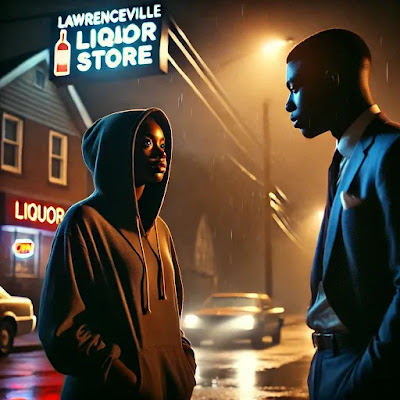A soulmate is someone you feel a deep connection with, often considered a compatible partner with a separate soul, while a twin flame is believed to be the other half of your soul, meaning you can only have one twin flame, but can have multiple soulmates throughout your life; the twin flame relationship is often described as more intense and challenging, pushing you to confront your deepest self, while a soulmate relationship tends to be more harmonious and supportive.
Key points to remember:
You can have many soulmates, but only one twin flame.
The Fire Between Us
By Olivia Salter
Word Count: 1,011
Warren never believed in past lives.
But when he saw Aisha, he wondered.
Not because she was beautiful, though she was. Not because she looked at him like she knew his secrets before he spoke them.
But because something in his bones whispered, It’s her. Again.
She stood at the counter of a coffee shop, drumming her fingers against the glass case, waiting. And when she turned, their eyes met.
A flicker. A pull.
Deja vu.
Aisha blinked, lips parting slightly, like she felt it too.
And Warren?
He forgot what he was supposed to be doing.
Three months later, she had a key to his apartment.
Not because they talked about it—because they didn’t.
Because it was always supposed to happen this way.
Aisha never let him hide.
She saw him in ways that unsettled him, stripped him bare without touching him.
One night, she stood in the kitchen, arms crossed, eyes steady. “You love the idea of love, Warren. But real love? It asks something of you. And you don’t like that.”
His stomach tightened. “That’s not fair.”
“Isn’t it?” She stepped closer, searching his face. “You write about love like it’s something outside of you. Like a thing you can observe without feeling it. But when it’s real—when it’s messy—you pull away.”
He wanted to argue. He wanted to tell her she was wrong.
But he couldn’t.
Because she wasn’t.
Terry met Warren at a poetry reading. She wasn’t supposed to be there. It was one of those last-minute, why not? decisions.
Then he stepped up to the mic.
And he spoke.
Not about love—at least, not in the way most people did. He spoke about hunger. About a yearning that stretched across lifetimes.
She watched him, felt the words settle in her chest like something familiar. And when he glanced her way, there was a quiet hum beneath her skin.
Not a jolt. Not a fire.
A thread.
That night, after the event, she lingered near the door just as he walked past. He paused, looking at her the way people look at something they don’t expect but can’t ignore.
And then he said, “You ever feel like some things are supposed to happen?”
She smiled, tilting her head. “Yeah.”
And that was the start of everything.
Warren and Terry never rushed.
It wasn’t fireworks. It was warmth.
Conversations that stretched into the early hours. Walks through the city when neither of them wanted to be anywhere else. A comfort he hadn’t known he needed.
One night, they sat on her couch, the air between them thick with unspoken things.
She leaned against his shoulder, and he let out a breath he hadn’t realized he was holding.
“You’re waiting,” she murmured.
His jaw tightened. “For what?”
“For a sign.” Her voice was steady. “For something to tell you it’s okay to move on.”
His chest ached.
Because she was right.
And still, he didn’t kiss her.
Even when the silence between them felt like an invitation.
Even when he wanted to.
Because she wasn’t his to want.
Not yet.
Aisha left on a Thursday.
Not in the heat of an argument. Not with yelling or broken things.
With a suitcase by the door and her hands clenched into fists.
Warren stood there, heart hammering, trying to think of the right words.
“I love you, Warren,” she said softly. “But love shouldn’t feel like a war.”
He swallowed hard. “Aisha—”
She shook her head, exhaling shakily. “You don’t get to talk me out of this. Not this time.”
His fingers twitched. A part of him wanted to reach for her, to pull her back.
But love wasn’t supposed to be chains.
So he didn’t.
And that was the worst part.
Because he already knew—
Some loves aren’t meant to be kept.
Some are meant to break you open.
Terry didn’t ask questions when Warren showed up at her door.
She stepped aside, let him in, let him sit on her couch with his head in his hands.
After a long moment, he whispered, “I lost her.”
Terry didn’t say I know. Didn’t say I told you so.
She just reached out, fingers brushing against his wrist, anchoring him.
His breath hitched.
And when he finally looked at her, she met his gaze, steady and sure. His eyes looked tired, searching. “I don’t know who I am without her.”
“You’re you, you're still here,” she murmured.
His exhale was shaky.
And this time, when he leaned in, she didn’t hesitate.
She met him halfway.
It was different with Terry.
No firestorms. No wreckage.
Just warmth.
She didn’t demand the parts of him he wasn’t ready to give. She didn’t pull him into the depths just to see if he could survive.
She was a place to rest. A place to breathe.
And he loved her for it.
But some nights, when sleep wouldn’t come, he felt it.
The phantom ache.
Because some loves don’t leave.
Even when they’re gone.
Aisha called him a year later.
Not by accident.
She never did things by accident.
“Hey,” she said.
Warren closed his eyes, the sound of her voice settling over him like an old song. “Hey.”
“I saw your book,” she said. “Congratulations.”
He smiled faintly. “Thanks.”
Silence.
Then, softly, “Do you ever think about me?”
His chest tightened. He didn’t need to ask if she still thought about him; because he knew she did.
“Yes,” he said.
A breath.
Then she exhaled, something almost like a laugh. “I always knew we weren’t supposed to last.”
His fingers curled around the phone. “I know.”
A pause.
Then, quieter, “Are you happy?”
His gaze drifted across the room, where Terry sat reading, her bare feet tucked beneath her, the quiet presence that had become his peace.
And he thought about all the ways love could exist.
“I am,” he said.
Aisha sighed, soft and knowing. “Good.”
And he knew that was the last time they’d speak.
Because some people come into your life to stay.
And some come to set you free.
















